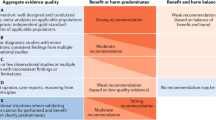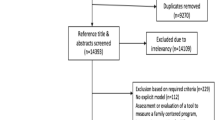Abstract
Background
The circumstances surrounding chronic kidney disease and its impact on families can be complex and difficult to navigate, leading to these cases being labeled “challenging.”
Case presentation
We present the case of an adolescent with kidney failure due to unremitting systemic illness and multiple complications ultimately resulting in the family’s request to forgo dialysis. Medical team members wrestled with meeting the family’s needs among internal and external constraints.
Conclusion
Past experiences, systemic inequities, differing perspectives, and consequential decision-making within individual belief systems can lead to friction between and among medical team members and families. As pediatric nephrologists, we must shift our focus from the “challenging” patient or family to addressing what is challenging their ability to flourishing.
Similar content being viewed by others
References
Fadiman A (1997) The spirit catches you and you fall down: a Hmong child, her American doctors, and the collision of two cultures. Farrar, Straus, and Giroux, New York
van Ryn M, Saha S (2011) Exploring unconscious bias in disparities research and medical education. JAMA 306:995–996
Liu J, Gill E, Li S (2021) Revisiting cultural competence. Clin Teach 18:191–197
Curtis E, Jones R, Tipene-Leach D, Walker C, Loring B, Paine SJ, Reid P (2019) Why cultural safety rather than cultural competency is required to achieve health equity: a literature review and recommended definition. Int J Equity Health 18:174
Purnell L (2000) A description of the Purnell model for cultural competence. J Transcult Nurs 11:40–46
Agner J (2020) Moving from cultural competence to cultural humility in occupational therapy: a paradigm shift. Am J Occup Ther 74:7404347010p7404347011-7404347010p7404347017
Purnell TS, Hall YN, Boulware LE (2012) Understanding and overcoming barriers to living kidney donation among racial and ethnic minorities in the United States. Adv Chronic Kidney Dis 19:244–251
El-Dassouki N, Wong D, Toews DM, Gill J, Edwards B, Orchanian-Cheff A, Neves P, Marshall LJ, Mucsi I (2021) Barriers to accessing kidney transplantation among populations marginalized by race and ethnicity in Canada: a scoping review part 2-East Asian, South Asian, and African, Caribbean, and Black Canadians. Can J Kidney Health Dis 8:2054358121996834
El-Dassouki N, Wong D, Toews DM, Gill J, Edwards B, Orchanian-Cheff A, Smith M, Neves P, Marshall LJ, Mucsi I (2021) Barriers to accessing kidney transplantation among populations marginalized by race and ethnicity in Canada: a scoping review part 1-indigenous communities in Canada. Can J Kidney Health Dis 8:2054358121996835
Devitt J, Anderson K, Cunningham J, Preece C, Snelling P, Cass A (2017) Difficult conversations: Australian indigenous patients’ views on kidney transplantation. BMC Nephrol 18:310
Anderson K, Yeates K, Cunningham J, Devitt J, Cass A (2009) They really want to go back home, they hate it here: the importance of place in Canadian health professionals’ views on the barriers facing Aboriginal patients accessing kidney transplants. Health Place 15:390–393
Axelrod DA, Kynard-Amerson CS, Wojciechowski D, Jacobs M, Lentine KL, Schnitzler M, Peipert JD, Waterman AD (2017) Cultural competency of a mobile, customized patient education tool for improving potential kidney transplant recipients’ knowledge and decision-making. Clin Transplant 31:e12944
Gordon EJ, Reddy E, Gil S, Feinglass J, Rodde J, Abecassis MM, Caicedo JC (2014) Culturally competent transplant program improves Hispanics’ knowledge and attitudes about live kidney donation and transplant. Prog Transplant 24:56–68
Jaiswal J, Halkitis PN (2019) Towards a more inclusive and dynamic understanding of medical mistrust informed by science. Behav Med 45:79–85
Hostetter M, Klein S (2021) Understanding and ameliorating medical mistrust among Black Americans. Transforming care (newsletter). Commonwealth Fund. https://www.commonwealthfund.org/publications/newsletter-article/2021/jan/medical-mistrust-among-black-americans, https://doi.org/10.26099/9grt-2b21. Accessed 1 June 2023
Washington HA (2006) Medical apartheid : the dark history of medical experimentation on Black Americans from colonial times to the present. Doubleday, New York
Gamble VN (1997) Under the shadow of Tuskegee: African Americans and health care. Am J Public Health 87:1773–1778
Manning KD (2020) More than medical mistrust. Lancet 396:1481–1482
Bailey ZD, Krieger N, Agénor M, Graves J, Linos N, Bassett MT (2017) Structural racism and health inequities in the USA: evidence and interventions. Lancet 389:1453–1463
Jameton A (1984) Nursing practice : the ethical issues. Prentice-Hall, Englewood Cliffs, NJ
Jenkins KA, Keddem S, Bekele SB, Augustine KE, Long JA (2022) Perspectives on racism in health care among Black veterans with chronic kidney disease. JAMA Netw Open 5:e2211900
Pais P, Wightman A (2022) Addressing the ethical challenges of providing kidney failure care for children: a global stance. Front Pediatr 10:842783
Tate TP, Pearlman RA (2016) Military metaphors in health care: who are we actually trying to help? Am J Bioeth 16:15–17
Buchanan AE, Brock DW (1989) Deciding for others: the ethics of surrogate decision making. Cambridge University Press, Cambridge, New York
Salter EK (2012) Deciding for a child: a comprehensive analysis of the best interest standard. Theor Med Bioeth 33:179–198
Diekema DS (2004) Parental refusals of medical treatment: the harm principle as threshold for state intervention. Theor Med Bioeth 25:243–264
Wightman AG, Freeman MA (2016) Update on ethical issues in pediatric dialysis: has pediatric dialysis become morally obligatory? Clin J Am Soc Nephrol 11:1456–1462
Butler CR, Wightman AG (2023) Beyond autonomy: ethics of decision making about treatments for kidney failure at the extremes of age. Am J Kidney Dis 82:360–367
Wightman A (2019) Caregiver burden in pediatric dialysis. Pediatr Nephrol 35:1575–1583
Wightman A, Kett J, Campelia G, Wilfond BS (2019) The relational potential standard: rethinking the ethical justification for life-sustaining treatment for children with profound cognitive disabilities. Hastings Cent Rep 49:18–25
Wightman A, Zimmerman CT, Neul S, Lepere K, Cedars K, Opel D (2019) Caregiver experience in pediatric dialysis. Pediatrics 143:e20182102
Agerskov H, Thiesson HC, Pedersen BD (2019) Everyday life experiences in families with a child with kidney disease. J Ren Care 45:205–211
Tong A, Lowe A, Sainsbury P, Craig JC (2010) Parental perspectives on caring for a child with chronic kidney disease: an in-depth interview study. Child Care Health Dev 36:549–557
Medway M, Tong A, Craig JC, Kim S, Mackie F, McTaggart S, Walker A, Wong G (2015) Parental perspectives on the financial impact of caring for a child with CKD. Am J Kidney Dis 65:384–393
House T, Wightman A (2021) Adding life to their years: the current state of pediatric palliative care in chronic kidney disease. Kidney360 2:1063–1071
Kalantar-Zadeh K, Wightman A, Liao S (2020) Ensuring choice for people with kidney failure - dialysis, supportive care, and hope. N Engl J Med 383:99
Center to Advance Palliative Care (2023) About palliative care. https://www.capc.org/about/palliative-care/. Accessed 24 May 2023
Hawley P (2017) Barriers to access to palliative care. Palliat Care 10:1178224216688887
Section on hospice and palliative medicine and committee on hospital care (2013) Pediatric palliative care and hospice care commitments, guidelines, and recommendations. Pediatrics 132:966–972
Quill TE, Abernethy AP (2013) Generalist plus specialist palliative care–creating a more sustainable model. N Engl J Med 368:1173–1175
Kalantar-Zadeh K, Lockwood MB, Rhee CM, Tantisattamo E, Andreoli S, Balducci A, Laffin P, Harris T, Knight R, Kumaraswami L, Liakopoulos V, Lui SF, Kumar S, Ng M, Saadi G, Ulasi I, Tong A, Li PK (2022) Patient-centred approaches for the management of unpleasant symptoms in kidney disease. Nat Rev Nephrol 18:185–198
Keefer P, Lehmann K, Shanley M, Woloszyk T, Khang E, Luckritz K, Saul D (2017) Single-center experience providing palliative care to pediatric patients with end-stage renal disease. J Palliat Med 20:845–849
Francis A, Didsbury MS, van Zwieten A, Chen K, James LJ, Kim S, Howard K, Williams G, Bahat Treidel O, McTaggart S, Walker A, Mackie F, Kara T, Nassar N, Teixeira-Pinto A, Tong A, Johnson D, Craig JC, Wong G (2019) Quality of life of children and adolescents with chronic kidney disease: a cross-sectional study. Arch Dis Child 104:134–140
Endén K, Tainio J, Jalanko H, Jahnukainen K, Jahnukainen T (2018) Lower quality of life in young men after pediatric kidney transplantation when compared to healthy controls and survivors of childhood leukemia-a cross-sectional study. Transpl Int 31:157–164
Kogon AJ, Vander Stoep A, Weiss NS, Smith J, Flynn JT, McCauley E (2013) Depression and its associated factors in pediatric chronic kidney disease. Pediatr Nephrol 28:1855–1861
Rodriguez Cuellar CI, García de la Puente S, Hernández Moraria J, Bojórquez Ochoa A, Filler G, Zaltzman Grishevich S (2019) High depression rates among pediatric renal replacement therapy patients: a cross-sectional study. Pediatr Transplant 23:e13591
Bush R, Upadhyay K, McPeters S (2022) Identification of anxiety and depression among adolescent kidney transplant recipients: a cross-sectional observational study. J Pediatr Health Care 36:270–276
Hind T, Lui S, Moon E, Broad K, Lang S, Schreiber RA, Armstrong K, Blydt-Hansen TD (2021) Post-traumatic stress as a determinant of quality of life in pediatric solid-organ transplant recipients. Pediatr Transplant 25:e14005
Back AL, Arnold RM, Baile WF, Tulsky JA, Fryer-Edwards K (2005) Approaching difficult communication tasks in oncology. CA Cancer J Clin 55:164–177
Rosenzweig MQ (2012) Breaking bad news: a guide for effective and empathetic communication. Nurse Pract 37:1–4
Feudtner C, Womer J, Augustin R, Remke S, Wolfe J, Friebert S, Weissman D (2013) Pediatric palliative care programs in children’s hospitals: a cross-sectional national survey. Pediatrics 132:1063–1070
Schell JO, Arnold RM (2012) NephroTalk: communication tools to enhance patient-centered care. Semin Dial 25:611–616
Acknowledgements
This manuscript was developed in follow-up to “When we don’t see eye to eye: when two worlds collide, and patient care is compromised,” our workshop presented at the Pediatric Academic Society meeting in Washington, DC 2023.
Author information
Authors and Affiliations
Corresponding author
Ethics declarations
Conflict of interest
The authors declare no competing interests.
Additional information
Publisher's Note
Springer Nature remains neutral with regard to jurisdictional claims in published maps and institutional affiliations.
Key points
• Pediatric nephrologists should be attuned to their individual perspectives that inform clinical interactions, the breadth of challenges encountered by patients with marginalized identities, and the need to approach these power dynamics with cultural humility.
• Medical mistrust can be based in historical legacies of medical misconduct and reinforced by current issues of structural racism affecting the way that patients interact with the medical system leading to poorer health outcomes.
• Ethical frameworks and concepts can provide a structured approach to understanding the competing tensions that contribute to “challenging” cases.
• Pediatric nephrologists should apply principles of palliative care including attending to physical symptoms and psychosocial suffering and delivering high quality serious illness communication to enable patient and family flourishing in “challenging” cases.
Rights and permissions
Springer Nature or its licensor (e.g. a society or other partner) holds exclusive rights to this article under a publishing agreement with the author(s) or other rightsholder(s); author self-archiving of the accepted manuscript version of this article is solely governed by the terms of such publishing agreement and applicable law.
About this article
Cite this article
Brunson, C., House, T.R., Noone, D. et al. Management dilemmas in pediatric nephrology: moving from friction to flourishing in “challenging” cases. Pediatr Nephrol (2024). https://doi.org/10.1007/s00467-024-06384-8
Received:
Revised:
Accepted:
Published:
DOI: https://doi.org/10.1007/s00467-024-06384-8




